Players have near-zero interest in Concord as Sony seems to be driving itself into live service trap
Concord, an upcoming hero shooter from Sony’s Firewalk Studios, doesn’t look promising. While burying the game before launch might be too much, early metrics clearly point to a major problem with modern publishers’ unhealthy obsession with live services.

Concord beta: what do the numbers say?
On July 12, Firewalk Studios launched a closed beta for people who pre-purchased Concord on PlayStation and PC, as well as PS Plus subscribers. From July 18 to July 21, the studio also ran an open beta for all players.
Despite being free-to-access for everyone, it only peaked at 2,338 concurrent players on Steam at launch and steadily declined over the weekend (via SteamDB). The CCU count could be higher on PlayStation, but Sony doesn’t disclose its internal data. And it is also unclear how many users in total have tried Concord since July 12.
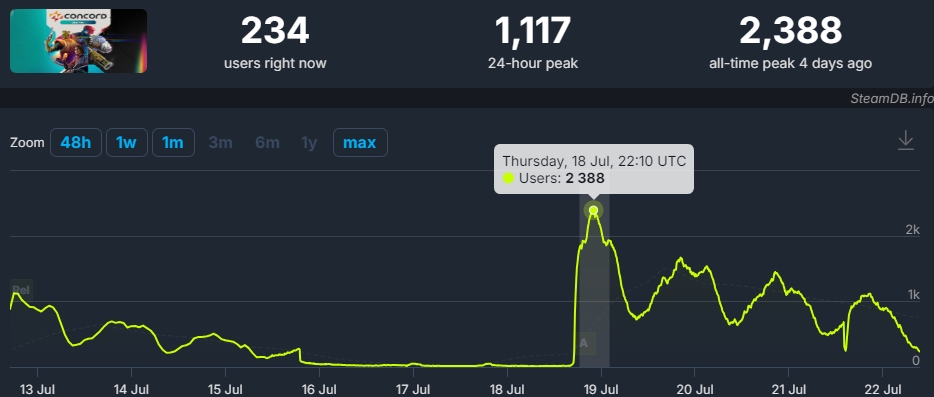
Either way, the Steam numbers are far from impressive. Just look at the metrics of another open beta held on the platform during the same period, NCSoft’s upcoming MMORPG Throne and Liberty, which peaked at over 61k CCU.
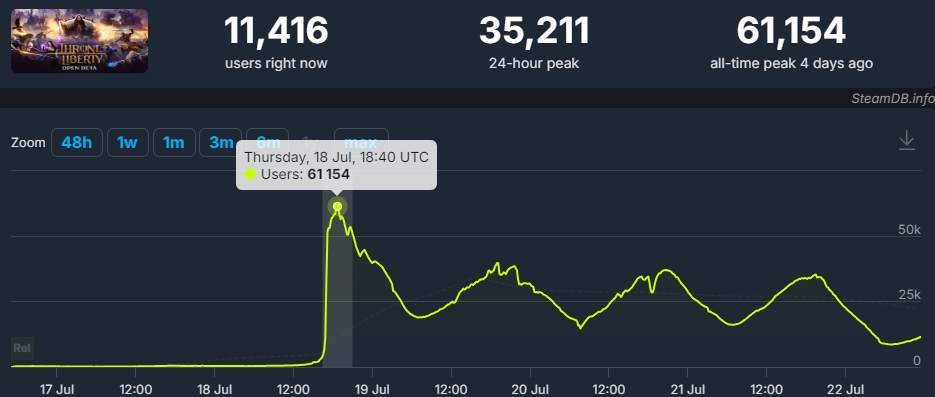
The Concord open beta had almost the same peak CCU as Hades II’s closed technical test (1,833 CCU). The comparison is not entirely fair, since these are completely different titles. The thing is, though, that when you are preparing to launch a live service game aimed at long-term support and player engagement, you want to reach a lot more (like, A LOT more) people than an indie studio.
For example, The Finals playtest peaked at 267k concurrent users and attracted a total of 7.5 million unique players in two weeks, while Marvel Rivals managed to reach almost 11k CCU during its closed alpha in May.
Although both games are free-to-play, the Concord beta was also free for everyone. And having just over 2,000 people online at max during an open playtest is a worrying sign for a AAA multiplayer game.
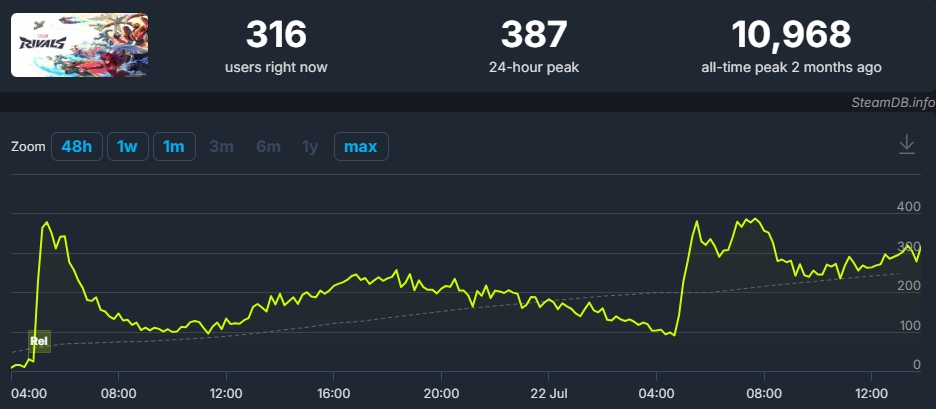
Officially announced during the PlayStation Showcase in May, Concord is not even in the top 500 on Steam’s most wishlisted games list. It is currently ranked 824th — right between the Void Shadows DLC for Warhammer 40k: Rogue Trader and Petit Island, a cozy adventure game from Indonesian indie developer Xelo Games.
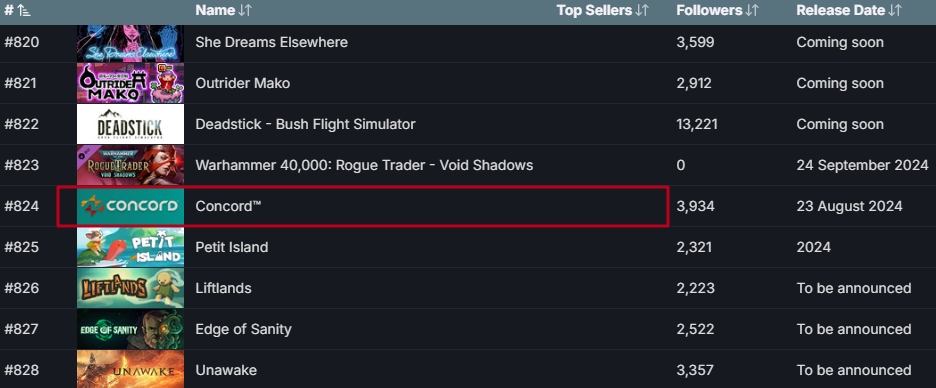
For comparison, here are the rankings of other major games showcased during non-E3 summer events: Civilization VII (#14), Doom: The Dark Ages (#48), Dragon Age: The Veilguard (#55), Call of Duty: Black Ops 6 (#58), and Indiana Jones and the Great Circle (#83).
These titles are based on popular franchises or world-famous IPs, but Concord also lags far behind upcoming PC ports of Sony’s first-party games like God of War Ragnarök (#69) and Until Dawn (#96). Not to mention dozens of indie releases.
As in the case with player numbers, some may argue that Concord’s main platform is PlayStation. While it is likely true, this publicly available data is just an indicator of general player interest. And, unfortunately, Steam users don’t seem to care that much about Firewalk’s upcoming shooter.
In addition, is worth checking out Concord’s stats on YouTube. Its beta trailer has generated over 100k views since July 11, but received over 13k dislikes with only 1.8k upvotes. The ratio is also true for in-game story cinematics, which are branded as one of the game’s selling points. “The Stars Are Ours” and “Vocal Cartographer” episodes currently have a like/dislike ratio of 1.5k/4.5k and 891/2.4k, respectively.

Even if you filter out all the comments about character design and pronouns, the main issues that potential players have with Concord are its gameplay and $40 price tag. It is summed up perfectly in this comment: “Guys, let’s make our own Overwatch and release it like 8 years too late.”
“It’s a trap!” but who cares?

Sony announced its live service plans after acquiring Bungie in 2022. The company initially wanted to release 12 GaaS titles by March 2026, with Jim Ryan calling it an “untapped opportunity” for PlayStation.
Last fiscal year (ended March 31, 2024), the company planned to increase the share of investment in live services to 55% compared to traditional games. The idea was to develop multiplayer titles based on its core franchises like The Last of Us and Horizon, while also betting on some original IPs from other first-party teams like Haven Studios (Fairgame$) and Firewalk (Concord).
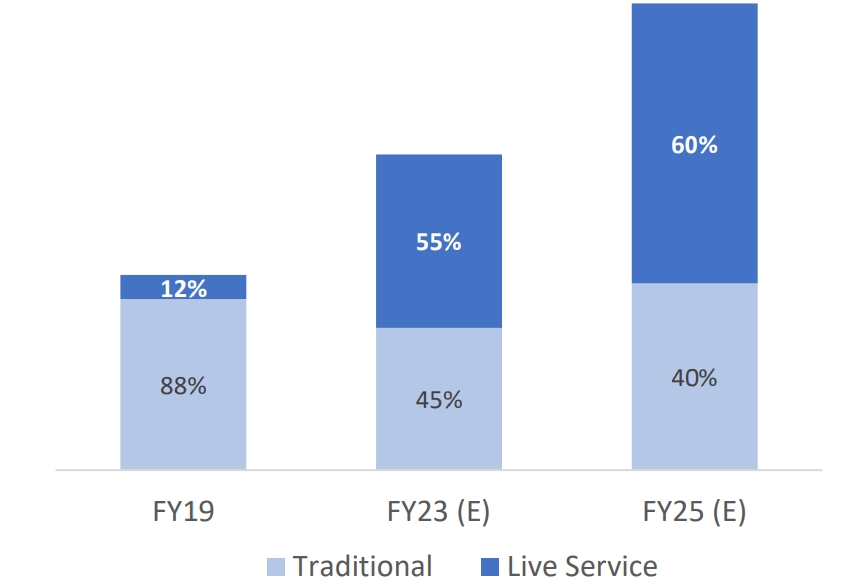
PlayStation’s investment by business model (as of May 2023)
At the end of 2023, ambitions were scaled back after several live service titles received negative reviews from Bungie and Naughty Dog canceled its multiplayer TLoU game. The company decreased the number of projects in its pipeline from 12 to six, with Sony president and CFO Hiroki Totoki saying that “it’s not like we stick to certain titles, but game quality should be the most important [thing].”
It is unclear how many projects have been scrapped or revised since then, but Concord has certainly survived. However, it is mind-boggling that Sony is planning to enter the hero shooter niche with a premium game in 2024.
Even if we assume that Concord has unique features and gameplay mechanics (spoiler: it doesn’t), it is unclear how it will fight for players’ time and survive in the ocean of free-to-play giants like Apex Legends, Valorant, and Overwatch 2. Not to mention the broader live service market, which is already divided among Fortnite and other big winners.
Name a company that wouldn’t want a game that can generate $1+ billion in recurring revenue per year. So it is not surprising that publishers keep pushing through these gates and make plans based on napkin math. However, most corporations still don’t realize that a) you need teams with certain skills and experience to develop strong multiplayer games; b) people don’t have time to play several GaaS projects at once.
Last year, BioWare former producer Mark Darrah explained what he called a “live service trap”: “The mistake is you can only really play one Destiny at a time. You can only do one engrossing live service at a time. So what happens in cases where one game is going to dominate your attention, you end up having a very tall steep head and a very thin tail because people play where the people are. So these live services tend to be dominated by one winner, two or three runners-up, and then a lot of live services that aren’t really surviving.”
For now, Concord risks ending up in the latter category — just like every other recently emerged hero shooter (e.g. FragPunk, Marvel Rivals). But they are at least free-to-play titles, unlike Firewalk’s upcoming game. Not to mention, Valve is ready to enter the genre with its mysterious project Deadlock. The game hasn’t even been officially announced yet, but its closed alpha peaked at 2,648 concurrent players.
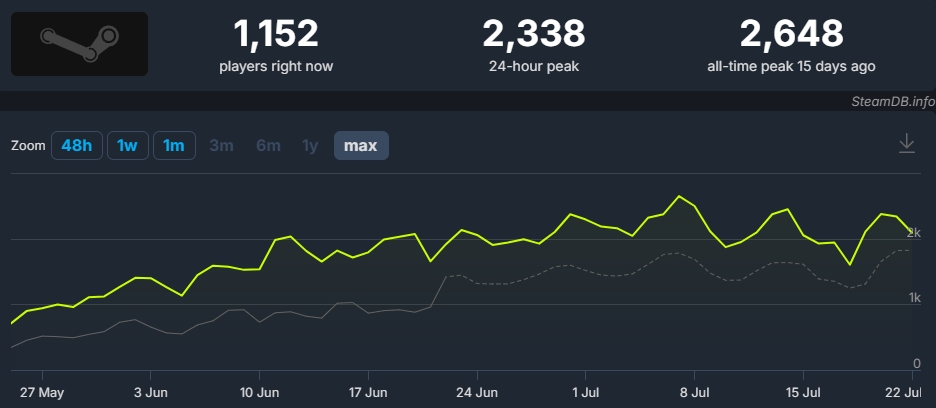
Deadlock’s concurrent player count (closed alpha)
Some might point out that Helldivers 2, one of this year’s biggest hits, had the same $40 price tag as Concord. But Arrowhead’s co-op shooter is not just your average bland GaaS project. It offers a truly unique concept and gameplay that makes it a fun and refreshing experience, resulting in over 12 million units sold across PC and PS5 in just 12 weeks (Steam accounted for 60% of its US sales).
So far, Helldivers 2 is Sony’s only success in the live service field. And it is somewhat funny that the game was made by a third-party studio, whose creative decisions were not dictated by corporate managers.
We’ll be glad to be wrong, but Concord, which tries to appeal to everybody in its belated pursuit of industry trends, has every chance to become a game that appeals to nobody. And no graphics, AAA budgets, or story cinematics guarantee that it will survive. It is not what keeps players engaged, but rather a combination of fun core mechanics and lots of regularly released content updates.
So how many more burned millions and closed studios will it take for publishers to finally stop driving themselves into this trap? The question is rhetorical.